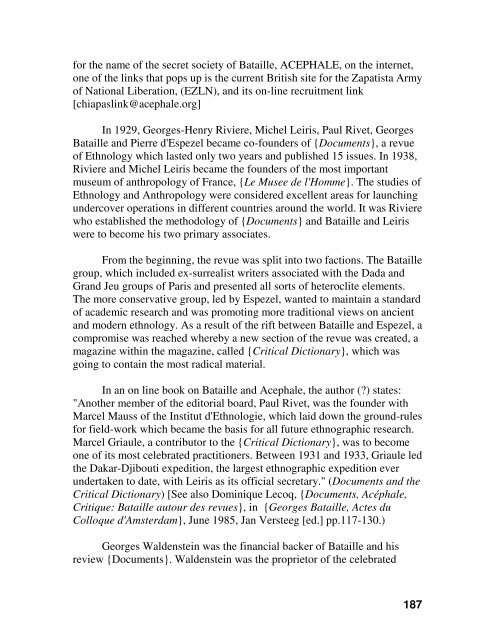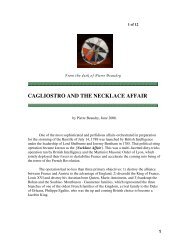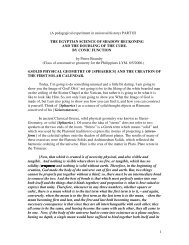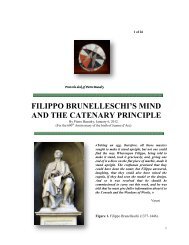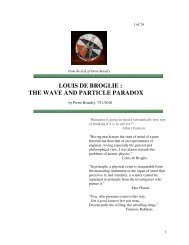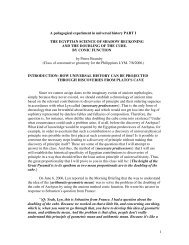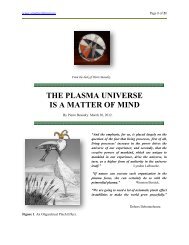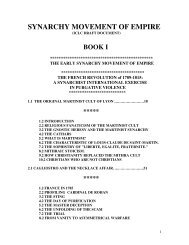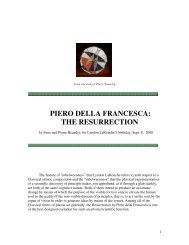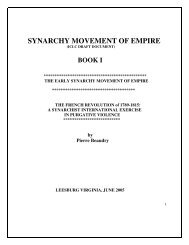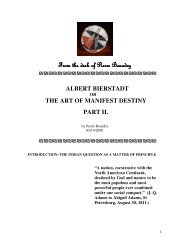synarchy movement of empire book ii - Pierre Beaudry's Galactic ...
synarchy movement of empire book ii - Pierre Beaudry's Galactic ...
synarchy movement of empire book ii - Pierre Beaudry's Galactic ...
You also want an ePaper? Increase the reach of your titles
YUMPU automatically turns print PDFs into web optimized ePapers that Google loves.
for the name <strong>of</strong> the secret society <strong>of</strong> Bataille, ACEPHALE, on the internet,<br />
one <strong>of</strong> the links that pops up is the current British site for the Zapatista Army<br />
<strong>of</strong> National Liberation, (EZLN), and its on-line recruitment link<br />
[chiapaslink@acephale.org]<br />
In 1929, Georges-Henry Riviere, Michel Leiris, Paul Rivet, Georges<br />
Bataille and <strong>Pierre</strong> d'Espezel became co-founders <strong>of</strong> {Documents}, a revue<br />
<strong>of</strong> Ethnology which lasted only two years and published 15 issues. In 1938,<br />
Riviere and Michel Leiris became the founders <strong>of</strong> the most important<br />
museum <strong>of</strong> anthropology <strong>of</strong> France, {Le Musee de l'Homme}. The studies <strong>of</strong><br />
Ethnology and Anthropology were considered excellent areas for launching<br />
undercover operations in different countries around the world. It was Riviere<br />
who established the methodology <strong>of</strong> {Documents} and Bataille and Leiris<br />
were to become his two primary associates.<br />
From the beginning, the revue was split into two factions. The Bataille<br />
group, which included ex-surrealist writers associated with the Dada and<br />
Grand Jeu groups <strong>of</strong> Paris and presented all sorts <strong>of</strong> heteroclite elements.<br />
The more conservative group, led by Espezel, wanted to maintain a standard<br />
<strong>of</strong> academic research and was promoting more traditional views on ancient<br />
and modern ethnology. As a result <strong>of</strong> the rift between Bataille and Espezel, a<br />
compromise was reached whereby a new section <strong>of</strong> the revue was created, a<br />
magazine within the magazine, called {Critical Dictionary}, which was<br />
going to contain the most radical material.<br />
In an on line <strong>book</strong> on Bataille and Acephale, the author (?) states:<br />
"Another member <strong>of</strong> the editorial board, Paul Rivet, was the founder with<br />
Marcel Mauss <strong>of</strong> the Institut d'Ethnologie, which laid down the ground-rules<br />
for field-work which became the basis for all future ethnographic research.<br />
Marcel Griaule, a contributor to the {Critical Dictionary}, was to become<br />
one <strong>of</strong> its most celebrated practitioners. Between 1931 and 1933, Griaule led<br />
the Dakar-Djibouti expedition, the largest ethnographic expedition ever<br />
undertaken to date, with Leiris as its <strong>of</strong>ficial secretary." (Documents and the<br />
Critical Dictionary) [See also Dominique Lecoq, {Documents, Acéphale,<br />
Critique: Bataille autour des revues}, in {Georges Bataille, Actes du<br />
Colloque d'Amsterdam}, June 1985, Jan Versteeg [ed.] pp.117-130.)<br />
Georges Waldenstein was the financial backer <strong>of</strong> Bataille and his<br />
review {Documents}. Waldenstein was the proprietor <strong>of</strong> the celebrated<br />
187


